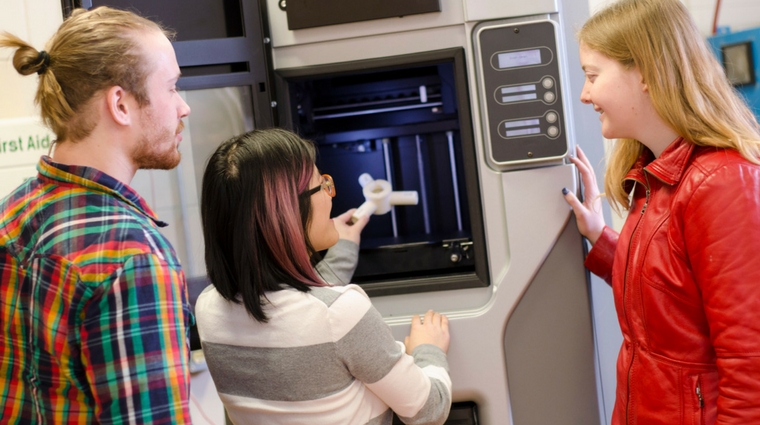
New Advanced Manufacturing lab expansion at Saskatoon campus increases opportunities for industry experts
Responding to industry needs means that sometimes you have to invest in new technology and new spaces. At Saskatchewan Polytechnic, that’s exactly why the CAD/CAM Engineering Technology diploma program is expanding its Advanced Manufacturing lab.
“We have consistently been at the leading edge of industry,” says Jamie Hilts, Sask Polytech’s dean of the School of Mining, Energy and Manufacturing and the School of Natural Resources and Built Environment. “This expansion allows us to continue to offer our industry partners valuable applied research opportunities to solve the real-world problems they face every day.”
The expansion will update existing equipment, expand into new areas and consolidate the additive manufacturing capabilities, to create a new space that incorporates better options for large-scale and high strength 3D printing. Included in the expansion are two new additive manufacturing machines (also known as 3D printers). One is for large parts with a footprint of up to 1m x 1m, and the other is capable of printing composites with continuous fiber reinforcement.
“We led the province into the area of additive manufacturing — now better known as 3D printing — in 1995 when it was called rapid prototyping,” says Tim Muench, program head for the CAD/CAM and Mechanical Engineering programs. “By adding an Additive Manufacturing space by consolidating the new equipment with existing, we can continue being a leader.”
Muench adds that future plans for the expanded lab will be to include equipment that will allow industry and students the ability to incorporate augmented reality into manufacturing systems.
“Augmented reality is the next big advancement in manufacturing technology and we plan to be a leader in that too,” he says.
Manufacturing success
One of the biggest benefits to this expansion is being able to provide industry experts with access to state-of-the-art equipment to improve their own business, solve problems and develop applied research projects that will have a positive impact on the local, provincial and national economy.
“Working with industry experts provides opportunities for everyone and can result in some of the best learning opportunities for our students,” says Hilts. “If we work together, everyone can be successful.”
Partnerships that benefit from this lab expansion have already started to see the rewards. Recently, the CAD/CAM Engineering Technology diploma program partnered with Arden Phillips, a former student and chief operating officer at Create Café, a 3D printing company in Saskatoon, on an applied research project. The project was to enhance one of Create Café’s machines to grow its business. Similarly, students can access the machinery in the expanded Sask Polytech lab to design and build student projects such as a lightweight, ultra-fuel-efficient vehicle, which will be racing in the 2018 Shell Eco-Marathon in California.
“One of the biggest advantages is that our students will be able to graduate and enter industry as technology leaders and can move into their careers with the expertise employers are looking for,” says Muench.
Through applied research, Sask Polytech collaborates with companies and individuals to solve business challenges. Through testing and pursing innovation, the institution enables companies to capture new opportunities.
To learn more about applied research opportunities at Sask Polytech, please visit www.saskpolytech.ca/research.
This article was originally published in Industry West magazine. Industry West Magazine is a quarterly published business magazine with informative, objective and timely editorial and advertising content for the province’s business community.
Published November 2017.

